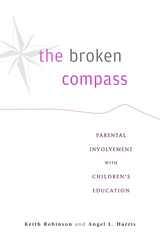
It seems like common sense that children do better when parents are actively involved in their schooling. But how well does the evidence stack up? The Broken Compass puts this question to the test in the most thorough scientific investigation to date of how parents across socioeconomic and ethnic groups contribute to the academic performance of K-12 children. The study's surprising discovery is that no clear connection exists between parental involvement and improved student performance.
Keith Robinson and Angel Harris assessed over sixty measures of parental participation, at home and in school. Some of the associations they found between socioeconomic status and educational involvement were consistent with past studies. Yet other results ran contrary to previous research and popular perceptions. It is not the case that Hispanic and African American parents are less concerned with education than other ethnic groups--or that "tiger parenting" among Asian Americans gets the desired results. In fact, many low-income parents across a wide spectrum want to be involved in their children's school lives, but they often receive little support from the school system. And for immigrant families, language barriers only worsen the problem.
While Robinson and Harris do not wish to discourage parents' interest, they believe that the time has come to seriously reconsider whether greater parental involvement can make much of a dent in the basic problems facing their children's education today. This provocative study challenges some of our most cherished beliefs about the role of family in educational success.
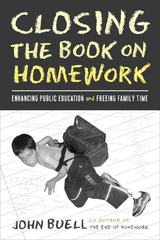
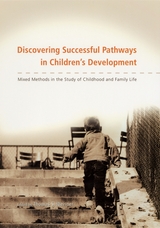
This volume includes new studies of minority and immigrant families, school achievement, culture, race and gender, poverty, identity, and experiments and interventions meant to improve family and child contexts. Discovering Successful Pathways in Children's Development will be of enormous value to everyone interested in the issues of human development, education, and social welfare, and among professionals charged with the task of improving the lives of children in our communities.
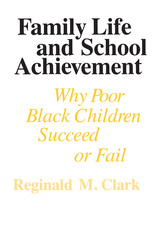
To support his contentions, Clark offers ten intimate portraits of Black families in Chicago. Visiting the homes of poor one- and two-parent families of high and low achievers, Clark made detailed observations on the quality of home life, noting how family habits and interactions affect school success and what characteristics of family life provide children with "school survival skills," a complex of behaviors, attitudes, and knowledge that are the essential elements in academic success.
Clark's conclusions lead to exciting implications for educational policy. If school achievement is not dependent on family structure or income, parents can learn to inculcate school survival skills in their children. Clark offers specific suggestions and strategies for use by teachers, parents, school administrators, and social service policy makers, but his work will also find an audience in urban anthropology, family studies, and Black studies.
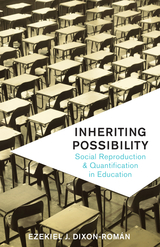
How has the dominant social scientific paradigm limited our understanding of the impact of inherited economic resources, social privilege, and sociocultural practices on multigenerational inequality? In what ways might multiple forces of social difference haunt quantitative measurements of ability such as the SAT? Building on new materialist philosophy, Inheriting Possibility rethinks methods of quantification and theories of social reproduction in education, demonstrating that test performance results and parenting practices convey the impact of materially and historically contingent patterns of differential possibility.
Ezekiel J. Dixon-Román explores the dualism of nature and culture that has undergirded theories of inheritance, social reproduction, and human learning and development. Research and debate on the reproduction of power relations have rested on a premise that nature is made up of fixed universals on which the creative, intellective, and discursive play of culture are based. Drawing on recent work in the physical and biological sciences, Dixon-Román argues that nature is culture. He contends that by assuming a rigid nature/culture binary, we ultimately limit our understanding of how power relations are reproduced.
Through innovative analyses of empirical data and cultural artifacts, Dixon-Román boldly reconsiders how we conceptualize the processes of inheritance and approach social inquiry in order to profoundly sharpen understanding and address the reproducing forces of inequality.
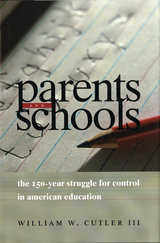
Cutler shows how in the 1920s and 1930s schools expanded their responsibility for children's well-being outside the classroom. These efforts sowed the seeds for later conflict as schools came to be held accountable for solving society's problems. Finally, he brings the reader into recent decades, in which a breakdown of trust, racial tension, and "parents' rights" have taken the story full circle, with parents and schools once again at odds.
Cutler's book is an invaluable guide to understanding how parent-teacher cooperation, which is essential for our children's educational success, might be achieved.
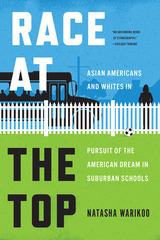
The American suburb conjures an image of picturesque privilege: manicured lawns, quiet streets, and—most important to parents—high-quality schools. These elite enclaves are also historically white, allowing many white Americans to safeguard their privileges by using public schools to help their children enter top colleges. That’s changing, however, as Asian American professionals increasingly move into wealthy suburban areas to give their kids that same leg up for their college applications and future careers.
As Natasha Warikoo shows in Race at the Top, white and Asian parents alike will do anything to help their children get to the top of the achievement pile. She takes us into the affluent suburban East Coast school she calls “Woodcrest High,” with a student body about one-half white and one-third Asian American. As increasing numbers of Woodcrest’s Asian American students earn star-pupil status, many whites feel displaced from the top of the academic hierarchy, and their frustrations grow. To maintain their children’s edge, some white parents complain to the school that schoolwork has become too rigorous. They also emphasize excellence in extracurriculars like sports and theater, which maintains their children’s advantage.
Warikoo reveals how, even when they are bested, white families in Woodcrest work to change the rules in their favor so they can remain the winners of the meritocracy game. Along the way, Warikoo explores urgent issues of racial and economic inequality that play out in affluent suburban American high schools. Caught in a race for power and privilege at the very top of society, what families in towns like Woodcrest fail to see is that everyone in their race is getting a medal—the children who actually lose are those living beyond their town’s boundaries.
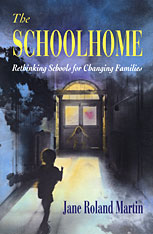


p>Young Children Learning provides vivid insight into the way young children think, talk, and learn from their mothers. It reveals the richness of the home as a learning environment and shows how much children can learn through the ordinary conversations of everyday life.
The book describes a research study in which four-year-old girls were tape-recorded talking to their mothers at home and to their teachers at nursery school. At home the children range freely over a wide variety of topics--work, the family, birth, growing up, death. They talk about plans for the future and puzzle over such diverse topics as the shapes of roofs and chairs, the nature of Father Christmas, and whether the queen wears curlers in bed. In many conversations the children are actively struggling to understand a new idea or the meaning of an unfamiliar word. These "passages of intellectual search" show the children to be persistent and logical thinkers.
In sharp contrast, the conversations between these same children and their nursery school teachers lack richness, depth, and variety. The questioning, puzzling child is gone: in her place is a child who seems subdued and whose conversations with adults are mainly restricted to answering questions rather than asking them. These observations show how strongly young children can be affected by the move from one setting to another, and they suggest that, even at the nursery stage, children reserve their best thinking for outside the classroom, with a resulting compartmentalization of the knowledge they acquire at school.
The book challenges the widely held belief that parents need to learn from professionals how to educate and bring up their children; above all, it persuades us to value parenting more highly and to have respect for the intellectual capabilities of young minds.
READERS
Browse our collection.
PUBLISHERS
See BiblioVault's publisher services.
STUDENT SERVICES
Files for college accessibility offices.
UChicago Accessibility Resources
home | accessibility | search | about | contact us
BiblioVault ® 2001 - 2024
The University of Chicago Press









